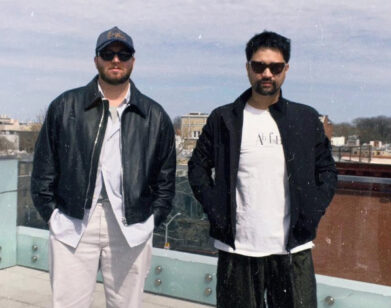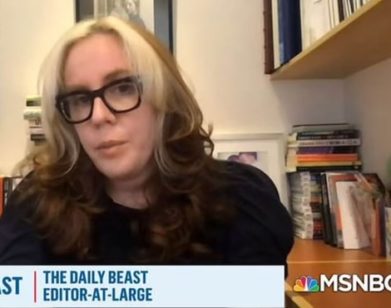Leon Neyfakh Takes On This Turning Point in American History
Leon Neyfakh has made a career out of the turning points in American history. As the co-creator and former host of Slate’s Slow Burn podcast, he explored the impact of Watergate and the impeachment of Bill Clinton. On the latest season of his current podcast Fiasco, premiering on Luminary August 13, he’ll investigate the Boston Busing Crisis of the 1970s, speaking with key Black activists who launched the campaign to desegregate the city’s schools. Neyfakh’s work exposes pages in the history books that were often omitted from print, distilling the chaos of America’s past into a reflection on its present. So who better to consult for some guidance during this particularly tumultuous time?
———
INTERVIEW: Where are you and how long have you been isolating?
LEON NEYFAKH: Right now I’m in Rhode Island with my wife [the journalist Alice Gregory] and the four friends we’ve been isolating with on and off since March. I’m here for two weeks, sort of on vacation but not really, because the trip ended up aligning with the most intense part of the production process for Fiasco. Today I’m up early to finish a script, which I’ll spend the rest of the day recording in a closet.
INTERVIEW: What has this pandemic confirmed or reinforced about your view of society?
NEYFAKH: I’m gonna warn you: I’m an awful pundit, in part because I’m conscious of how narrow any one person’s experience is. I’m rarely confident that my “take” on such big questions is right, and I don’t walk around with a lot of theories in my head about how things work while they’re happening. That said, the pandemic has confirmed my sense that literally anything can become a fault line in a culture war.
INTERVIEW: What has this pandemic altered about your view of society?
NEYFAKH: I’m surprised by how easily I’ve gotten used to the death toll, how abstractly I think about it. I suspect this is a widely shared feeling. It’s not how I would have thought I’d experience an extended period of mass death.
INTERVIEW: What is the worst-case scenario for the future?
NEYFAKH: Things get just fine enough for just enough people that any shared urgency for change fades. I fear that when the Trump presidency ends, the desire to move on and not think about it will short-circuit the acute national reckoning that needs to happen. (This is what I mean about my punditry. “Acute national reckoning”…?)
INTERVIEW: What good can come out of this lockdown? Are there any reasons to hope?
NEYFAKH: The flip side of my worst case would be… the Trump years somehow inspire the country to become a more equal and more humane place.
INTERVIEW: What has been your daily routine during this time?
NEYFAKH: I wish I had a specific routine. I feel like it would really stabilize things. Instead, I make it up as I go along every day, down to when I have coffee, what I eat for lunch, etc. Workwise, it’s a combination of writing and editing Fiasco scripts, recording my narration, doing interviews, and making decisions with people on Slack and Zoom. In addition to the editorial work I’m doing on Fiasco, I’m also overseeing a bunch of other podcasts and running a small business. When Andrew Parsons and I left Slate and Slow Burn, we started an independent podcast studio, Prologue Projects, and we now have five shows in production—including 5-4, a podcast hosted by three leftist lawyers about how much the Supreme Court sucks—and a bunch more in development.
INTERVIEW: Describe the current state of your hair?
NEYFAKH: Someone here said Liam Gallagher, which I’m good with. Oasis was my first concert. There’s a great documentary about Oasis called Supersonic that, now that I’m thinking about it, I’d love to watch again.
INTERVIEW: On a scale of 1 to 10, what is your level of panic about the current state of the world?
NEYFAKH: I’ll say 10. Seems as bad as it could possibly be, a sense that is reinforced, paradoxically, by the certainty that it’ll get worse. (I think I’m stealing that formulation from someone.) I will say though that “panic,” to me, doesn’t mean thinking about it every second and experiencing physical symptoms of anxiety. It’s more like being reminded of it at uneven intervals throughout the day, and confronting the fact that I have no idea what’s going to happen.
INTERVIEW: Do you think there is hope for true racial equality in the United States? What do you think is the first step in that goal?
NEYFAKH: This is a question I feel unqualified to answer with any implied authority. But my instinct is to say that, yes, there is hope. One of the most persuasive facts I feel like you can present to someone who is skeptical about the need for change is that unfathomably brutal practices were absolutely common, like, five minutes ago. I was taught in school to think of racism as a long-ago thing that the Civil Rights Movement, also a long-ago thing, fixed. The photos were very much in black and white. But the truth is, Jim Crow ended five minutes ago. I think there’s some cause for despair there, but also hope—the fact that it’s unfathomable means a lot has changed, and that means a lot more still could.
INTERVIEW: How can America work to ensure more equality and justice on a day-to-day level?
NEYFAKH: Not to make you self-conscious but: when we’re writing Fiasco, we always catch ourselves writing narration like, “The city of Boston was anguished.” Or, “The photograph that shook America.” And we almost always change it because it’s like, “Who are we talking about?” My general philosophy is that abstract pronouncements about how things are—as opposed to concrete statements of fact: what happened, who said what—leave a lot of room for fake ideas that sound right but maybe aren’t. Anyway, sorry to edit your question. One answer would be: desegregate the public schools.
INTERVIEW: Do you think protests are effective tools for changing the system? How does it make a difference in the long term?
NEYFAKH: Absolutely. As I see it, the point of protests is to compel the people who aren’t there—but who might be passing by, or hearing about it from the media or their friends—to think about something specific. What happened earlier this summer was that the protests were so all-consuming and widespread that it plausibly felt like “everyone” in the country was aware of them. A way higher share of the population than usual was suddenly thinking about the issues the protestors were raising. And I think that’s the “crucible” in which public opinion shifts, as evidenced by the huge jump over the past few years in how people think about race and policing.
INTERVIEW: How do you personally channel your anger? Do you find anger to be a useful emotion?
NEYFAKH: This is a great question we should all be asking ourselves. When I think about how school desegregation happened in Boston, and how we’re portraying it on the new season of Fiasco, what I see is the power of rage. The Black activists who created the movement for education equality in Boston were angry, and I think that motivated them. At the same time, obviously, the violent backlash that greeted desegregation was also about anger, being channeled in a very different way.
INTERVIEW: Who are the young leaders of the moment that you are inspired by?
NEYFAKH: Lil Baby.
INTERVIEW: What’s the next step after protests in the streets? Where does the righteous rage go?
NEYFAKH: Leon Rock, one of the Boston activists we interviewed for Fiasco, told us that when he became an activist, he thought in terms of “agitation > education > legislation.” I think the question is who does what. I think it’s possible that the people who made the George Floyd protests happen should continue making protests happen, while other people take on the “education” and “legislation” parts. But I do think the moment of focus that a protest can conjure is an opportunity to change minds and create new pressures on elected officials.
INTERVIEW: Americans tend to find the topic of race uncomfortable. How do we start the conversation and address it directly?
NEYFAKH: I think there should be more recognition on the part of white people like me that believing in equality usually means giving something up. In the new season of Fiasco, listeners will hear a lot of white voices saying they believe in integration and equality but not in “busing” because it’s not fair to force white children into worse schools. The thing is, as [the journalist] Nikole Hannah-Jones has written, busing is the most immediate method of desegregating schools and making them equal. Of course someone has to give something up.
INTERVIEW: If 2020 were a song, which song would it be?
NEYFAKH: Juiceboxxx’s “Freaking Out.”
INTERVIEW: Where did we go wrong? Like, what was the exact moment?
NEYFAKH: As someone who makes podcasts about turning points in political history, I should really have an answer for this. But I do not. We were always wrong. The ways in which we malfunction and inflict deception and injustice on others have been remarkably consistent in America.
INTERVIEW: Which (admittedly totally unqualified) celebrity would you trust with the planet’s future?
NEYFAKH: Desus and Mero. I’m not even sure they’re that unqualified.
INTERVIEW: If you could stop time at one particular moment in your life, which moment would it be?
NEYFAKH: My wife Alice and I bringing our dog, Mickey, home. Our friend Teddy was there, too. A happy drive.
INTERVIEW: What’s one skill we should all learn while in quarantine?
NEYFAKH: Not looking at our phones when we’re with other people. I have been trying. I’m bad at it. But it is the key.
INTERVIEW: Who should be the next president of the United States?
NEYFAKH: I don’t know if “should” frees me up to think more imaginatively, but I’m going to keep things simple and say Joe Biden. (Traditionally journalists aren’t supposed to say who they’re voting for, but as a friend recently said to me, “What, I should be worried that in 20 years, someone will know I was for the reasonable guy?” That said, Biden’s role in keeping public schools segregated, which we’ll get into on the podcast, is… worth considering.)







